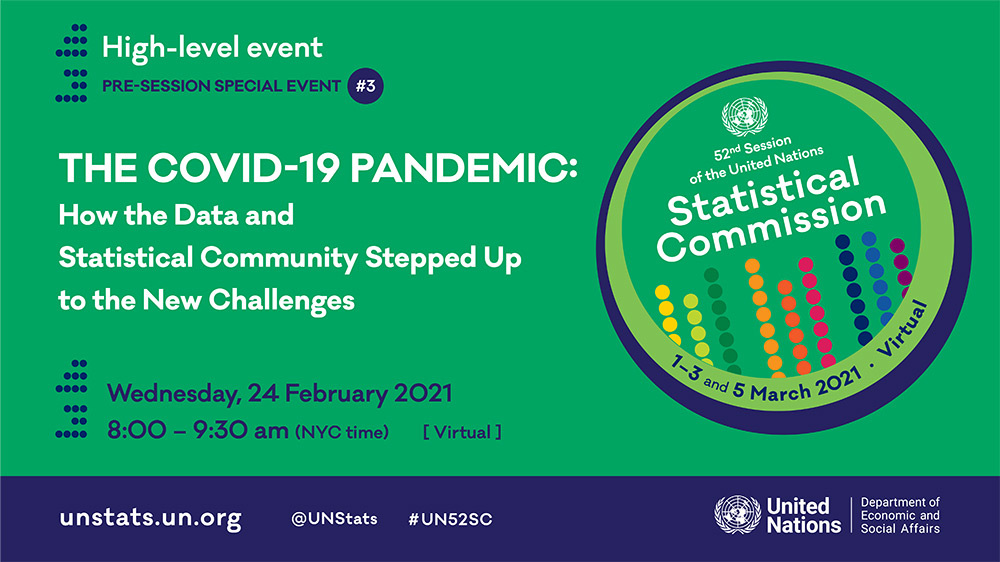United Nations Statistical Commission
Overview 52nd Session (2021) Side events

Summary report and presentations
Concept Note
The COVID-19 pandemic has created an unprecedented and urgent demand for data and statistics. Whether to inform decisions on how to contain the virus or mitigate the lasting economic and social impact on people's lives, especially among the most vulnerable in society, timely and disaggregated statistics have proven to be critical in the COVID-19 response.
Timely and disaggregated data on cases has been an indispensable tool in understanding the underlying drivers of the disease and identifying who is most at risk, and to try to contain and manage the pandemic. Data on the socio-economic impact has been essential to develop support programmes and plan the recovery. At the same time, the crisis has posed many challenges to the ability of National Statistical Offices to run key statistical programmes and produce and disseminate the data needed by policy and decision makers. Many National Statistical Offices have stepped up and risen to the occasion, providing the much-needed data and collaborating effectively with other parts of the governments and other stakeholders.
Sixty-two per cent of NSOs around the world have launched new data collection efforts to monitor the impact of COVID-19 and over 50 per cent have set up platforms to serve public data needs during the pandemic. Existing data tools have been repurposed to fulfill the immediate needs, including phone and web surveys, better use of administrative data and integration of data from social media, phone call records and crowdsourcing. This has involved collaborations between statistics offices and other parts of government, such as ministries of health, and also partnerships outside of government between statistics offices, the private sector and academia.
The global data and statistical community, in particular key partners including the United Nations Statistics Division, have launched a number of initiatives to offer support and access to tools and information as National Statistical Offices were navigating through the crisis.
This event provides the opportunity to look at the challenge caused by the increased data demands amidst serious disruptions of statistical operations caused by the pandemic; review the responses in countries; and discuss what type of support has been effective in supporting countries over the last year. It will also offer the space to discuss how the statistical and data community can build on the experiences of responsiveness and timeliness that have characterized the work of many NSOs, to move towards strong data systems that can produce timely, quality data to serve the public good, and that are agile and resilient in time of crises and disasters.
-
New data demands and use of data in the COVID-19 response
-
How the global statistical system has responded to countries' demand for guidance
-
Mr Stefan Schweinfest,
Director, UN Statistics Division
-
Country presentations: Experiences and emerging best practices in addressing new users' needs and data gaps
- Sir Ian Diamond, National Statistician of the United Kingdom
- Prof. Samuel Annim, Government Statistician of Ghana
- Ms. Sandra Quijad, Director of the National Institute of Statistics of Chile
- Q&A
-
How the global statistical system has responded to countries' demand for guidance
-
Building resilient data and statistical systems: what have we learned from the response to the current crisis?
A panel of representatives from the global statistical system and experts from private sector and civil society will discuss challenges and setbacks, contingency plans and new solutions and approaches implemented at the country level in order to ensure the continuity of key statistical programmes.
-
- Ms. Ola Awad, Palestinian Bureau of Statistics
- Ms. Mariana Kotzeva, Eurostat
- Ms. Linda Peters, Esri
- Mr. Oliver Chinganya, UN Economic Commission for Africa
- Mr. Anil Arora, Chief Statistician of Canada
- Ms. Shaida Badiee, Open Data Watch
-
Tentative Agenda
Moderator:
Ms. Jenna Slotin,
Global Partnership for Sustainable Development Data